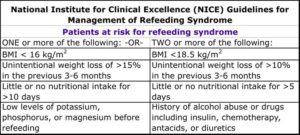- Calls to this hotline are currently being directed to Within Health, Fay or Eating Disorder Solutions
- Representatives are standing by 24/7 to help answer your questions
- All calls are confidential and HIPAA compliant
- There is no obligation or cost to call
- Eating Disorder Hope does not receive any commissions or fees dependent upon which provider you select
- Additional treatment providers are located on our directory or samhsa.gov
What is Medical Stabilization? Navigating Levels of Care in Eating Disorder Treatment

Contributor: Margherita Mascolo, MD, Medical Director, ACUTE Center for Eating Disorders at Denver Health
When you, a loved one or a patient is struggling with an eating disorder it can be very overwhelming to sort through the different treatment options and levels of care to find the best treatment facility in order for them to start their journey towards recovery.
- What are the various levels of care?
- What is the difference between medical stabilization and inpatient care?
- Will insurance cover the costs?
I hope to shed some light on the different levels of care and options available for the treatment of eating disorders.
Importance of Medical Stabilization
In general, expert medical stabilization is highly recommended for patients who are severely low weight, are medically compromised, or are at risk for the potentially deadly complications of refeeding syndrome as identified by the NICE Criteria, below. It is important to remember that there is no single marker to identify which of these at-risk patients will develop complications of refeeding syndrome.
Therefore, it is critical that every at-risk patient is medically monitored during the initial refeeding period by experienced medical providers who know how to identify and treat the serious complications associated with early refeeding.

Criteria for a medical admission, like at ACUTE, include:
- Weight of < 70% ideal body weight (maybe higher if patient is purging and needs to detox from behaviors)
- Vital sign abnormalities such as bradycardia (slow heart rate: < 40 beats per minute and strongly consider for < 50 beats per minute)
- Hypotension (systolic blood pressure < 85mmHg),
- Hypothermia (core temperature < 35.5C)
- Any rhythm on EKG other than sinus rhythm (any arrhythmia)
- Electrolyte abnormalities such as low potassium and low phosphorus, end organ dysfunction such as acute kidney failure or acute liver failure, and low glucose
Definitive medical stabilization refers to improvement/normalization of vital signs, cardiac stability, resolution of electrolyte abnormalities, completion of enough daily calories to begin weight restoration and successfully go through refeeding syndrome, adequate bowel functioning, and ability to complete activities of daily living in order to transition to a lower level of care.
It is important to note that each of these criteria must be met in order to be considered definitively medically stable. We often see patients who are admitted to their local hospital and released 24 hours later as “stable” with some IV fluids.
We know that many of the life threatening medical complications of refeeding syndrome won’t appear until the body is introduced to an appropriate amount of nutrition and therefore, hospitalization must include a careful progression of calories under close supervision in order to prevent full refeeding syndrome. This may take 2-3 weeks.
Continuing the Recovery Journey
Once the patient has achieved medical stability, they can transition to an inpatient or residential facility to continue their journey to recovery. At the inpatient and residential level of care they’ll begin participating in more intensive psychiatric work including group therapy, normalization of meals, and behavior modification with strong therapeutic support.
An important difference between a psychiatric inpatient level of care and a medical stabilization unit, like ACUTE, is insurance. Any medical hospitalization is covered under the medical insurance benefit, preserving the behavioral health benefit for long term therapeutic care.
If a patient i s so severely compromised that one-to-one monitoring, bed rest, and exclusion from group psychiatric care is necessary, they’re likely better served in a medical unit to deal with the medical issues associated with early refeeding rather than utilizing the often limited behavioral health benefits for this type of care.
s so severely compromised that one-to-one monitoring, bed rest, and exclusion from group psychiatric care is necessary, they’re likely better served in a medical unit to deal with the medical issues associated with early refeeding rather than utilizing the often limited behavioral health benefits for this type of care.
The best chance of recovery from an eating disorder is to reach and maintain the patient’s ideal body weight; this is best achieved by serially stepping down from the highest level of care and supervision to the lowest level of care and supervision until the patient is able to be independent.
Wishing you health and recovery,
Margherita Mascolo, MD
 About the Author: Margherita Mascolo, MD is a Board-Certified Internal Medicine Specialist, Medical Director at ACUTE Center for Eating Disorders and Assistant Professor of Medicine at the University of Colorado.
About the Author: Margherita Mascolo, MD is a Board-Certified Internal Medicine Specialist, Medical Director at ACUTE Center for Eating Disorders and Assistant Professor of Medicine at the University of Colorado.
Dr. Mascolo is the Interim Medical Director of ACUTE Center for Eating Disorder and a hospitalist at Denver Health. She completed her undergraduate work at the University of St. Thomas in Houston, Texas and earned her medical degree at the University of Texas Health Sciences Center. She completed her residency in Internal Medicine at the University of Colorado in Denver. She is board certified in Internal Medicine and is an Assistant Professor in the Department of Medicine at the University of Colorado. Dr. Mascolo is also proud to serve as Medical Liaison Chairperson for the IAEDP Denver Chapter.
The opinions and views of our guest contributors are shared to provide a broad perspective of eating disorders. These are not necessarily the views of Eating Disorder Hope, but an effort to offer discussion of various issues by different concerned individuals.
We at Eating Disorder Hope understand that eating disorders result from a combination of environmental and genetic factors. If you or a loved one are suffering from an eating disorder, please know that there is hope for you, and seek immediate professional help.
Reviewed By: Jacquelyn Ekern, MS, LPC on March 23, 2017.
Published on EatingDisorderHope.com

The EatingDisorderHope.com editorial team comprises experienced writers, editors, and medical reviewers specializing in eating disorders, treatment, and mental and behavioral health.

